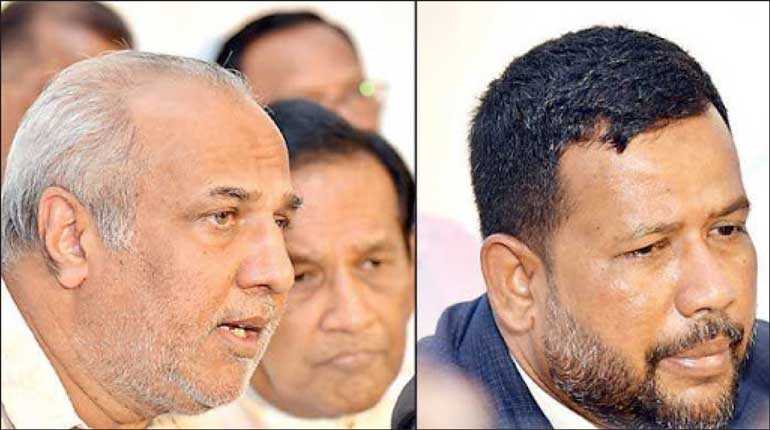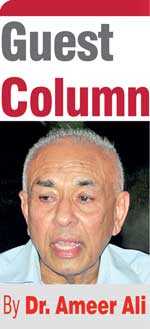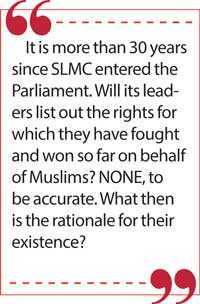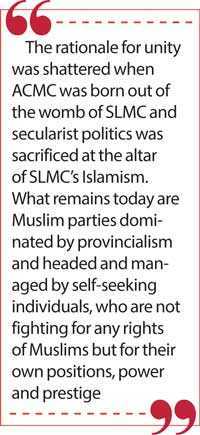Thursday Feb 12, 2026
Thursday Feb 12, 2026
Friday, 30 October 2020 00:00 - - {{hitsCtrl.values.hits}}

By continuing to keep the Muslims politically separated and preventing them, in the name of religious identity, from joining and supporting national parties, SLMC and ACMC are indirectly driving those parties to strengthen their own ethno-religious identity to capture votes from majority Sinhalese
Five years ago, in August 2015, a national newspaper published a short piece by this columnist titled,  ‘Muslims should reject SLMC and its offshoots wholesale’. It was said then, that “the creation of SLMC as a political party based solely on religion was a historic blunder, which, if not rectified soon, will drag the Muslim community into political abyss”. What was meant by rectification was the total dissolution of SLMC and ACMC.
‘Muslims should reject SLMC and its offshoots wholesale’. It was said then, that “the creation of SLMC as a political party based solely on religion was a historic blunder, which, if not rectified soon, will drag the Muslim community into political abyss”. What was meant by rectification was the total dissolution of SLMC and ACMC.
Now, having witnessed how surreptitiously and treacherously did the leaders and members of the two parties stage managed their voting tactics over the 20th Amendment, all with the single purpose of protecting and enhancing their individual positions and prestige, it is time the Muslim community comes to its senses and call these parvenus traitors and desert their parties en masse. SLMC and ACMC are a long-term liability not only to the survival of the Muslim community but also to the security of the country.
The only rationale for the formation of a national political organisation for Muslims, as advanced by its two earliest ideologues, of whom one was a poet and philosopher, Abdul Cader Lebbe from Kattankudy, and the other a retired District Judge, Mohamed Hussain from Kalmunai, was the need for unity among Muslims. They believed that given the circumstances created by JR’s ‘Gaullist’ constitution in 1978, only through unity under a single political organisation could Muslims overcome the electoral disadvantage caused by the system of proportional representation introduced by JR.
Those two gentlemen were admirers of secularist Muhammad Ali Jinnah, who was instrumental in uniting the Indian Muslims under a single political organisation, Indian Muslim League. With that unity Jinnah confronted the Hindu dominated Indian Congress, tenaciously argued and bargained with the British, and ultimately won a separate but disjointed country for Muslims, Pakistan.
It was from that experience the two ideologues started grooming a budding attorney at that time, M.H.M. Ashraff, who was also a nephew of the District Judge, to play a leading role in actualising their ideal. It was Hussain who introduced Ashraff to Lebbe and Ashraff was in constant touch with the poet until the latter’s demise in 1984. This is an unwritten chapter of the history of SLMC. (Incidentally, the seeds of SLMC were sown not in the Eastern Province as popularly known, but in Matale in the Central Province.)
 |
 |
However, the two philosophers totally misread the situation of Muslims in pre-partition India and Muslims in independent Sri Lanka. Unlike in India, Muslims of Sri Lanka never faced a threat of being swamped by the majority community. They were in a far better situation in comparison to their Indian brethren. Even when the JR Constitution was introduced there were a number of secular and progressive forces in the country that were agitating for the repeal of that constitution and against proportional representation.
It was a historic blunder on the part of the minorities, Tamils and Muslims, to choose their own independent but separate paths to fight for their rights, instead of joining in a national struggle under a progressive leadership. The rest is history.
Yet, as far as Muslims were concerned, what Lebbe and Hussain were hoping to achieve was not a Pakistan or a separate state like what the Tamils wanted, but a powerful secular political organisation to fight for the rights of Muslims in a united Sri Lanka. The two thinkers were no doubt, devout Muslims of the modernist variety, but they never dreamt of an Islamist party as SLMC turned out to be under Ashraff and his successors.
With the demise of that philosopher poet, Ashraff lost his political mentor and guide, and his party took an unfortunate turn and succumbed to Islamism to capture political power. (I have discussed this matter in greater detail in one of the chapters in a book to be published soon). That SLMC also became a vehicle to amass personal wealth for some of its leaders and their families is another ugly side of the party’s history
The rationale for unity was shattered when ACMC was born out of the womb of SLMC and secularist politics was sacrificed at the altar of SLMC’s Islamism. What remains today are Muslim parties dominated by provincialism and headed and managed by self-seeking individuals, who are not fighting for any rights of Muslims but for their own positions, power and prestige.
It is more than 30 years since SLMC entered the Parliament. Will its leaders list out the rights for which they have fought and won so far on behalf of Muslims? NONE, to be accurate. What then is the rationale for their existence?
By continuing to keep the Muslims politically separated and preventing them, in the name of religious identity, from joining and supporting national parties, SLMC and ACMC are indirectly driving those parties to strengthen their own ethno-religious identity to capture votes from majority Sinhalese.
This is an unsavoury outcome of identity politics preferred by the two minority communities, which also partly explains the rise of Buddhist supremacy after 2009. Today, those supremacists, their supporting organisations and apparatchiks have trapped the ruling regime into their net. The 20th Amendment is a symbol and product of their success. What prevents the UNP or SJB also from moving in the same direction in future?
To the Muslims, the SLMC and ACMC are irritant sources of embarrassment and liability. The undependability of their political loyalties as demonstrated by their behaviour in Parliament on 22 October marks the height of opportunism, treachery and duplicity. Democracy will remember these upstarts as Judas, who paved the way for an autocracy in Sri Lanka in return for a few pieces of silver. Does the Muslim community, after all it had gone through over the last few decades, feel proud of the SLMC and ACMC? If not, why allow these parties to exist?
The need of the day is for a third alternative that would be inclusive, democratic and secular, which can protect and cherish Sri Lanka’s pluralism in all its dimensions, and develop its economy within a unitary state. Only under the rule of such an alternative Muslims can find peace and prosperity. To search for and join hands with people from other communities who are also looking for that alternative is the task of Muslim intelligentsia. Will they wake up and take the initiative?
(The writer is attached to the School of Business & Governance, Murdoch University, Western Australia.)